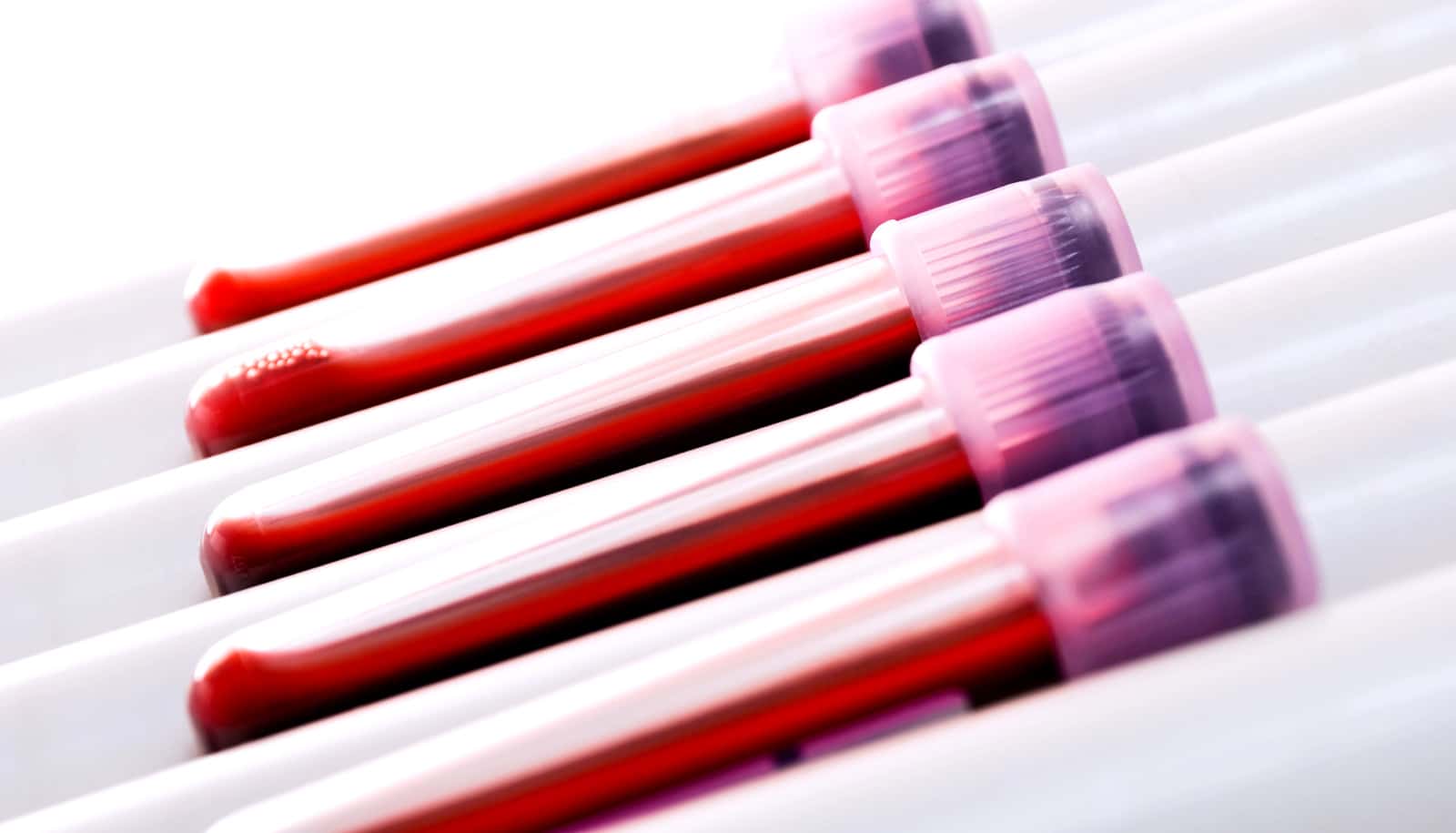New findings suggest a simple blood test could one day offer a way to diagnose Alzheimer’s disease—and monitor patients’ response to treatment.
Researchers designed a new system called APEX (Amplified Plasmonic Exosome) to pick up the aggregated amyloid beta (Aβ), an early-stage molecular marker of Alzheimer’s.
The new technology is highly sensitive and provides an accurate diagnosis—comparable to brain positron emission tomography (PET) imaging—the current gold standard for Alzheimer’s disease. The cost is only about $25 per test, less than 1 percent of the cost of PET imaging.
The current design could test 60 samples simultaneously and produce results in less than one hour, researchers say. Because the APEX system uses native blood plasma without additional sample processing, it conducts direct measurement and is very simple to use in clinical settings.

Simple, safe, and affordable
In 2018, dementia affected 50 million people worldwide, and experts expect the number to rise to 82 million by 2030 and 152 million by 2050. Every year, over 9.9 million new cases of dementia are diagnosed worldwide.
Alzheimer’s disease is the most common cause of dementia, researchers say. Due to its complex and progressive nature, early detection and intervention can improve the success of disease modifying therapies.
Unfortunately, current diagnosis and monitoring—using clinical evaluation and neuropsychological assessments—are subjective and the disease tends to be detected only at a late stage. Other alternatives such as PET imaging and cerebrospinal fluid tests are either too expensive for wide clinical adoption or require invasive lumbar punctures.
Blood-based tests, on the other hand, have the advantage of being safe, affordable, and easy to administer. However, one key challenge for scientists is that blood has very low concentrations of the molecules that indicate Alzheimer’s disease, and not all of these molecules are disease-reflective, making detection and diagnosis difficult.
The new system could be a big step forward in providing a solution to effectively “capture” and measure the most meaningful Alzheimer’s molecules in blood samples and amplify them for analysis, researchers say.
“There is currently no good blood-based method to effectively screen and monitor AD. New tests that are under investigation have either poor accuracy or low sensitivity,” says Shao Huilin, assistant professor from the Institute for Health Innovation & Technology (NUS iHealthtech) at the National University of Singapore.
“The APEX technology addresses both of these limitations and is therefore a very powerful and objective companion diagnostic system to complement existing clinical and neuropsychological tests for early detection and better management of AD.
“As blood tests are relatively easy to administer, APEX can be also used to monitor a patient’s response to treatment. Furthermore, this technology can be easily scaled up for large cohort clinical validations and drug evaluation.”
How the APEX system works
A key characteristic of Alzheimer’s disease is the buildup of amyloid beta (Aβ) proteins in the brain. These Aβ proteins clump up as aggregates and kill brain cells. Aβ proteins also release into and circulate through the bloodstream.
Researchers designed the APEX system to detect and analyze the earliest aggregated forms of Aβ proteins in blood samples, to allow detection of Alzheimer’s even before clinical symptoms appear and to accurately classify the disease stages.
“Traditional technologies measure all Aβ molecules found in the blood, regardless of their aggregation states, and thus show poor correlation to brain pathology. Our study found that the aggregated form of the protein could accurately reveal brain changes and reflect AD disease stages,” says Carine Lim, a doctoral student from NUS iHealthtech and NUS Biomedical Engineering, and co-first author of the study in Nature Communications.
The APEX technology is size-matched to distinguish this group of reflective Aβ proteins directly from blood samples. Each APEX chip is 3 cm by 3 cm—about a quarter the size of a credit card—and contains 60 neatly-arranged sensors, each to analyze one blood sample.
“Within each APEX sensor, there are millions of nanoholes to enable unique interactions with the aggregated Aβ. The APEX sensor recognizes the abnormal Aβ aggregates directly from a very small amount of blood, induces and amplifies a color change in the associated light signal,” says co-first author Zhang Yan, a doctoral student from NUS iHealthtech and NUS Biomedical Engineering.
APEX vs. PET
To determine the performance of the APEX system, Shao and her team conducted a clinical study involving 84 individuals, including patients diagnosed with Alzheimer’s or mild cognitive impairment, as well as a control group comprising healthy individuals and patients diagnosed with vascular dementia or neurovascular compromises. The researchers conducted PET imaging and blood sampling on all participants.
“The results of the APEX tests correlate extremely well with PET imaging results. The clinical study shows that the APEX system can accurately identify patients with AD and those with MCI; it also differentiates them from healthy individuals and patients suffering from other neurodegenerative diseases. In fact, this is the only blood test that shows such comparable results with PET imaging, the current gold standard for AD diagnosis,” Shao says.
Shao and her team are currently in discussions with industry partners to commercialize this technology. Researchers expect the device will reach market within the next five years.
In the next phase of research, the team hopes to use the technology to manage the disease and to evaluate therapeutics under development.
Source: Duke-NUS



